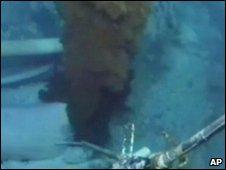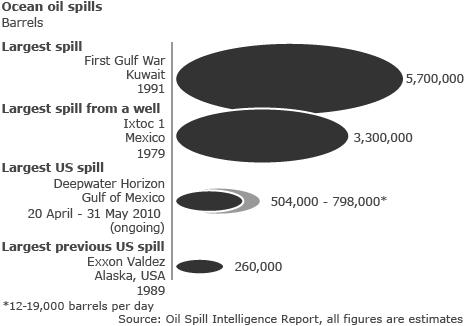Gulf oil spill: US begins criminal investigations
- Published
The US government has begun criminal and civil investigations into the Gulf of Mexico oil spill, Attorney General Eric Holder has announced.
He would not say which companies or individuals were being targeted.
Earlier, BP launched a new attempt to try to contain the spill from its well using undersea robots to cut off the fractured pipe and seal it with a cap.
BP said the spill - the largest in US history - might be capped within 24 hours, but success was not guaranteed.
BP's shares fell sharply on Tuesday following the failure of its previous efforts to "top kill" the leak by pumping mud into the well.
At one stage the share price hit its lowest level for 15 months, as stock markets digested the news that the US was "prepared for the worst scenario" that the leak might not be stopped before August.
'Forceful response'
Announcing the criminal investigations, Mr Holder said: "We will closely examine the actions of those involved in the spill.
"If we find evidence of illegal behaviour, we will be extremely forceful in our response."
Mr Holder, who was on his first visit to the affected region, said the companies involved had already been ordered to preserve their records.
"We will ensure that every cent, every cent of taxpayer money, will be repaid and that damage to the environment and wildlife will be reimbursed," he said.
Reuters news agency quoted BP as saying in a statement that it would "co-operate with any inquiry that the Department of Justice undertakes".
Speaking in Washington on Tuesday, President Barack Obama described the leak as "the greatest environmental disaster of its kind in our history" and pledged to bring those responsible to justice.
He said it was time to take a comprehensive look at how the oil industry operated and how US government agencies oversaw their operations.
Other companies involved with the Deepwater Horizon rig, which exploded on 20 April with the loss of 11 lives, include rig operator Transocean and oil services companies Halliburton and Cameron International.
Cautious note
In the latest attempt to fit a containment cap, remote-controlled robots on the seabed are cutting the damaged well riser in order to cap it and pipe the leaking oil to the surface.

BP plans to use underwater robots to cut a damaged pipe and lower a cap
Chief operating officer Doug Suttles said: "If everything goes well, within the next 24 hours we could have this contained."
But, striking a note of caution, he stressed that success was not guaranteed and urged people to "remember this is being done in 5,000 ft of water, and very small issues take a long time to fix".
BP says the procedure will take all week and it does not expect that cutting the riser will allow significantly more oil to escape.
But government scientists suggest the procedure could release up to 20% more oil initially and the White House says it does not believe BP has been forthcoming about the risks, the BBC's Richard Lister reports from Washington.
Previous attempts by BP to stem the flow of oil have all failed.
Meanwhile, the National Oceanic and Atmospheric Administration (NOAA) warned that winds forecast later this week could move the spill towards the Mississippi and Alabama coasts, which have been less badly affected than Louisiana's shores.
An oil sheen has been seen about nine miles (14.5km) off the coast of Florida, with officials warning it could reach Pensacola Beach by Wednesday, the Associated Press news agency reports.
Tuesday also marked the start of the hurricane season, with NOAA predicting up to 14 hurricanes, of which between three to seven will be "major" tempests, packing winds in excess of 110 mph.
At least 20 million gallons (76 million litres) have now spilled into the Gulf, affecting more than 70 miles (110km) of Louisiana's coastline.
BP has spent more than $940m (£645m) so far in trying to contain the disaster.
